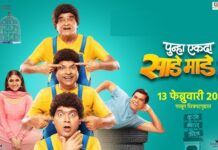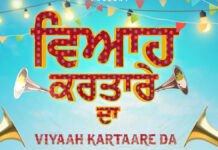Vinod Chopra Films and Fox Star Studios’ Ek Ladki Ko Dekha Toh Aisa Laga (UA) is a love story of an unusual kind.
Balbir Chaudhury (Anil Kapoor) lives with his daughter, Sweety (Sonam Kapoor Ahuja), son, Babloo (Abhishek Duhan), and mother, Bijee (Madhumalti Kapoor). Balbir runs a garments business.
Sahil Mirza (Rajkumar Rao) is a stage-play writer whom success has been eluding. A chance meeting between Sahil and Sweety creates a misunderstanding in the mind of Babloo that his sister, Sweety, is in love with Sahil who is Muslim. Babloo reveals this to the family which is not at all happy. Even though Sweety does not love Sahil, she is unable to express this to the family which is now worried. The fact is that Sweety just likes Sahil as a friend in whom she wants to confide her predicament.
Sweety’s predicament is that she has no feelings for men but likes girls instead. She has always been inclined towards girls but has never been able to come out of the closet. Brother Babloo is the only person in the family who knows about Sweety’s problem since school days but he has never shared this with the elders in the family. All he has done down the years is to try to correct Sweety.
Finally, a situation arises when Balbir Chaudhury agrees to marry off Sweety with Sahil. It may be mentioned here that Balbir is still not aware that Sweety and Sahil are not in love. In fact, it is somehow never anyone’s endeavour to clear the air about the real love story. Frankly, till Sweety does not share her ‘problem’ with Sahil, even he thinks that she loves him. And so, he is happy to be in Moga where Sweety lives, to conduct acting classes and hold stage-plays.
When Sahil does learn about Sweety’s curious love story, he thinks up a plan to reveal this to the family and world at large. For promoting the garments of Balbir’s garment factory, Sahil asks Balbir Chaudhury to hold a stage-play, the story of which would be written and directed by Sahil himself. Balbir agrees but when Sahil writes the love story of Sweety and Kuhu (Regina Cassandra, her current girlfriend), Balbir is aghast at the concept. Why, Kuhu herself has been called to play her part.
This is when Babloo reveals the truth about younger sister Sweety’s sexual orientation to the family. What happens thereafter? Does Balbir Chaudhury come around? Does Bijee accept Sweety and Kuhu’s relationship? Is Sahil’s play staged? What is the reaction of the people of Moga to the stage-play and to Sweety’s love story?
Gazal Dhaliwal and Shelly Chopra Dhar have penned a story and screenplay which draw inspiration from P.G. Wodehouse’s novel, A Damsel In Distress. The story is bold for the Hindi film-going audience, no doubt, because a commercial film’s heroine being shown in a homosexual relationship is not usual. But it is so shoddily written that a story like this would almost appear to be the norm. The two writers seem to have overlooked the fact that the story would require a change of mindset of the audience and hence, needed to have been written with much more understanding and care. They’ve actually treated it a bit too casually.
The drama is very slow-paced and often tests the audience’s patience. At times, it appears as if the two writers got excited about making a path-breaking film on same-sex relationship and went ahead with just this exciting thought, not bothered about the rest of the story. Besides being slow, there are several other drawbacks too. For one, there seems to be no communication between characters in the film. Babloo knows about Sweety’s sexual preferences since school days and although he is only slightly older than her, he doesn’t deem it proper to inform anybody else in the family about the same. Why? No plausible reasons are given. Again, the same Babloo assumes that Sweety is in love with a Muslim boy, Sahil! Isn’t it obvious that he would ask Sweety how she had fallen in love with a boy despite her sexual orientation? But nothing of the sort happens. He breaks the news about Sweety’s affair with a Muslim boy as if it’s the worst news in the world. The viewers wonder whether he felt relieved that she was in love with a guy (given that her sexual preference had haunted him all through their growing up years) or he felt equally or more traumatised that the guy she was in love with was a Muslim.
Sweety very conveniently never gets a chance to clarify that there’s nothing between her and Sahil. Why, even Sahil takes the news that Sweety loves him, in his stride so easily and doesn’t really care to know how it happened. In other words, the characters in the film behave weirdly even when it comes to matters of great importance. Clearly, the writer-duo had not much to convey in the first half and so, they very conveniently opted for misunderstandings to be created by showing both, Sweety and Sahil, tongue-tied each time there’s a reference made to their non-existent affair. Why it should be so difficult to just clarify that there’s no affair whatsoever is simply not explained.
Another major drawback of the duo’s screenplay is the climax. Given that the film tackles a bold subject, the climax ought to have been written with all the conviction at one’s command. But that’s exactly what’s lacking in the climax. It is so flat and so not convincing that it fails to have any impact on the viewers. For the writers to have assumed that such a shoddily written climax would change the mindsets of the audience and make them feel sympathetic towards same-sex relationships is nothing short of foolhardiness. Gazal Dhaliwal’s dialogues are good but not punch-packed, as was the need.
Anil Kapoor is sincere in his acting as Balbir Chaudhury. He is natural to the core and especially delivers a fantastic performance in the climax. Unfortunately, the climax fails to hold despite his acting – and that’s because of the poor scripting. Sonam Kapoor Ahuja looks very pretty and does a reasonably good job as Sweety. Her performance ought to have been splendid because it’s a path-breaking character she plays, but that’s not so. Rajkumar Rao is so easy in front of the camera that it’s delightful to see him play Sahil Mirza in the film. He is fantastic. Juhi Chawla is cute and plays well the suitably loud Punjabi that she is needed to portray as Chhatro. Abhishek Duhan is effective as Babloo Chaudhury. Regina Cassandra looks beautiful and is suitably restrained as Kuhu. Madhumalti Kapoor shines as Bijee. Seema Pahwa makes her presence amply felt in the role of household cook Billauri. Brijendra Kala is endearing as Chaubey. Alka Kaushal and Kanwaljit Singh leave their marks as Sahil’s parents. Akshay Oberoi looks handsome and is alright as Raza. Sandeep Kapoor has his moments as Joginder. Teddy Lalji Maurya (as the play director) is good. Manoj Bakshi’s comedy in the police station is entertaining. Sara Arjun (as the 12-year-old Sweety) leaves a fine impression with a lovely performance. Yash Arora is good as the 14-year-old Babloo. Dilnoor (as the 8-year-old Sweety), Hiten (as the 10-year-old Babloo), and the rest lend adequate support.
Shelly Chopra Dhar’s direction is weak. She has not been able to convert the drama into a moving or even an intelligent film. The narration is so flat and, like the script, is devoid of conviction. Music (Rochak Kohli) is quite good. The title song (recreated), ‘Gudi naalon ishq’ and ‘Chitthiye’ are well-tuned numbers. Lyrics (Gurpreet Saini) are appropriate. Song picturisations (Adil Sheikh for ‘Good morning’ and party song; and Mudassar for ‘Gudi naalon ishq’) are fairly nice. Background music (by Sanjay Wandrekar and Atul Raninga) is quite nice. Cinematography (Himman Dhamija; additional cinematography by Rangarajan Ramabadran) is very nice. Rajat Poddar and Teddy Lalji Maurya’s production designing is of a good standard. Ashish Suryavanshi’s editing could’ve been tighter.
On the whole, Ek Ladki Ko Dekha Toh Aisa Laga is a flop fare because it absolutely lacks conviction that a bold subject like the one it tackles required. It will find favour with a tiny section of the gentry but the rest of the public will reject it.
Released on 1-2-’19 at Regal (daily 3 shows) and other cinemas of Bombay thru Shringar Films Pvt. Ltd. Publicity: ordinary. Opening: poor. …….Also released all over. Opening was dull everywhere.





























